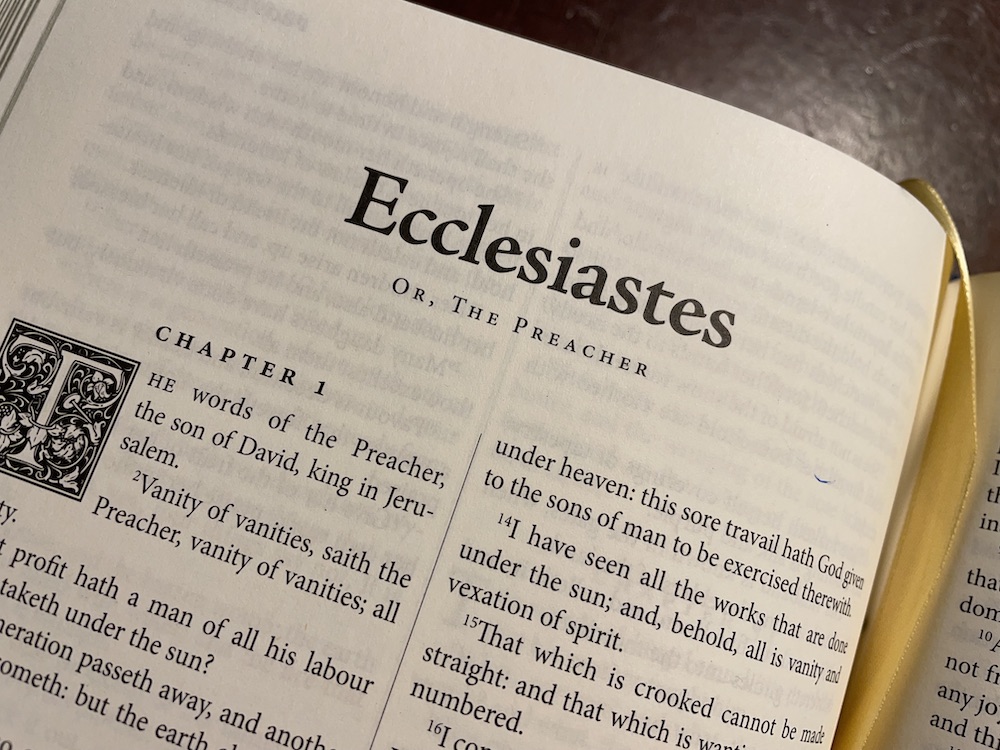
Ecclesiastes 9:1, The hand of Elohim. As the Preacher comes to the end of his treatise on the meaning (or lack thereof) of life, he begins to narrow his focus on the missing link, the key ingredient that gives an otherwise pointless life any meaning whatsoever, and that missing piece of the puzzle is the God principle.

Solomon begins by stating that those who are righteous and wise along with all that they do are in the hands of Elohim. In other words, Elohim is with those who seek him and he guides their activities. This is huge! Up to this point, the Preacher has demonstrated that all of life’s activities are basically meaningless and pointless, although one can squeeze some bits of joy out of life here and there, but even then, all humans end up in the same place—dead. Everyone is a condemned prisoner, who is a victim to the never-ending cycles of the time space continuum called life on this earth. So what is the point of it all? Minus some outside entity or force from without reaching down to man and lifting him out of his trapped condition, there is no hope of escape. However, the Preacher tosses the God principle into the mix and offers his reader a glimmer of hope. Somehow, if one will follow the path of wisdom and righteousness, the Creator will actually take notice of this poor, hapless human creature and will an alternative to those who will begin to look up. This is the beginning point of faith…
So who are righteous and wise? Righteousness and wisdom are not terms that are open to capricious and subjective human interpretations, but are specifically defined in Scripture.
Righteous is the Hebrew word saddiq meaning “just, lawful or righteous” and derives from the root verb sadeq meaning “to be just or righteous.” The root verb basically connotes conformity to a moral or ethical standard, according to The TWOT. So in a biblical context, what is the moral and ethical standard by which a righteous person is defined? It is the laws or commandments of YHVH Elohim, who is ultimately the Source of the Truth found in the Bible. So biblically, a righteous person is one who obeys the commandments and instructions of YHVH including his Torah-laws.
My tongue shall speak of Your word, for all Your commandments are righteousness. (Ps 119:172)
Your testimonies, which You have commanded, are righteous and very faithful. (Ps 119:138)
Your righteousness is an everlasting righteousness, and Your Torah-law is truth. (Ps 119:142)
Wisdom is the Hebrew word chockma and derives from the Hebrew root verb chokam meaning “to be wise or act wisely.” According to The TWOT, the essential idea of chokam represents a manner of thinking and attitude concerning life’s experiences. This includes matters of general interest and morality. These concerns relate to prudence in secular affairs, skills in the arts and moral sensitivity, and experience in the ways of YHVH. Scripture reveals that the beginning of wisdom is the fear and reverential awe of YHVH Elohim. Moreover, wisdom, fearing Elohim and walking in his ways are all synonymous concepts.
The fear of YHVH is the beginning of wisdom; a good understanding have all those who do His commandments. His praise endures forever. (Ps 111:10)
The fear of YHVH is the beginning of wisdom, and the knowledge of the Holy One is understanding. (Prov 9:10)
Love or hatred. Love, perhaps, is the number one thing that people are seeking their entire lives. We are creatures who want, no need, to be accepted, to be appreciated, to be loved. We are social beings; we were not made to be alone. Not only that, to one degree or another, each of us is dependent upon other people.
As evidence of the importance of love and acceptance, the marriage and family unit remains the bedrock basis of the society, and this is where it all starts. After that come the extended family including clans and tribes, villages, towns, cities, counties, states or provinces and, finally, nations. These are all social constructs where humans interact with each other in a somewhat orderly manner based on their need for and dependence on other humans.
Love for one’s fellow man, in fact, is the glue that holds society together. Hatred is what tears it apart resulting in conflicts.
People talk about love, but do they really know what it means? For example, a large percentage of our popular music concerns the subject of “love.” Many if not most movies either have “love” and romance as a main theme or at least as a subtheme woven into the main plot. Dogs are the most popular pet of humans in part because they transmit so much unconditional love. The sad things, though, is that according to the wise Preacher, what the popular culture considers to be love is not love at all. What is even sadder is that as vital to human existence as love is, few have discovered its true definition. This is because the true definition of love cannot even be discovered by looking to the popular culture.
Ecclesiastes 9:2, One events happens. Even though the Preacher has just stated that one the righteous and wise are in the hand of Elohim, death still happens to everyone whether they are righteous or wicked, religious or non-religious, a good person or a sinner and whether one fears Elohim or not.
Ecclesiastes 9:3, This is an evil. In this physical existence, the Preacher views death as the ultimate evil to befall every human. What person can disagree with the fact that death is the ultimate enemy?
Ecclesiastes 9:4, There is hope. As long as one is alive, there is hope. But what is that hope that the Preacher seems to be dangling in front of his reader, but still remains just out of reach?
Ecclesiastes 9:5–10, Enjoy life to the fullest. Even though death comes to all people, and after that, “the dead know nothing” and “the memory of them is forgotten” (v. 5), the Preacher encourages each of us to go and live one’s life to the fullest. “Eat your bread with joy,” “drink your wine with a merry heart,” (v. 7), wear nice clothes and keep yourself looking good (v. 8), enjoy your marriage and family (v. 9), and enjoy your work, for when the grave comes, there is nothing (v. 10).
Ecclesiastes 9:11–12, Time and chance. Life is full of countless unexpected twists and turns. Things that seem that they should be a certain way often are not. No one knows what evil will suddenly befall him or when he will die. So in the face of such stress-causing uncertainties, what is one to do? How does one cope with this?
Ecclesiastes 9:13–18, Wisdom. Wisdom is better than folly, yet even those who are wise and are able to avert many of the evils of life through the employment of wisdom still die and are forgotten. So now where does this live the reader?


Most people believe that the passions of the flesh that they experience to be love. WRONG!
Shalom, John